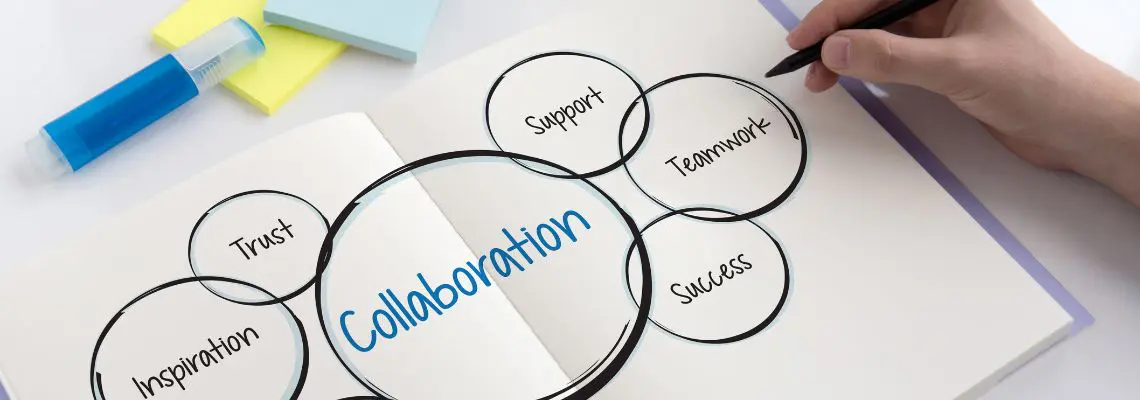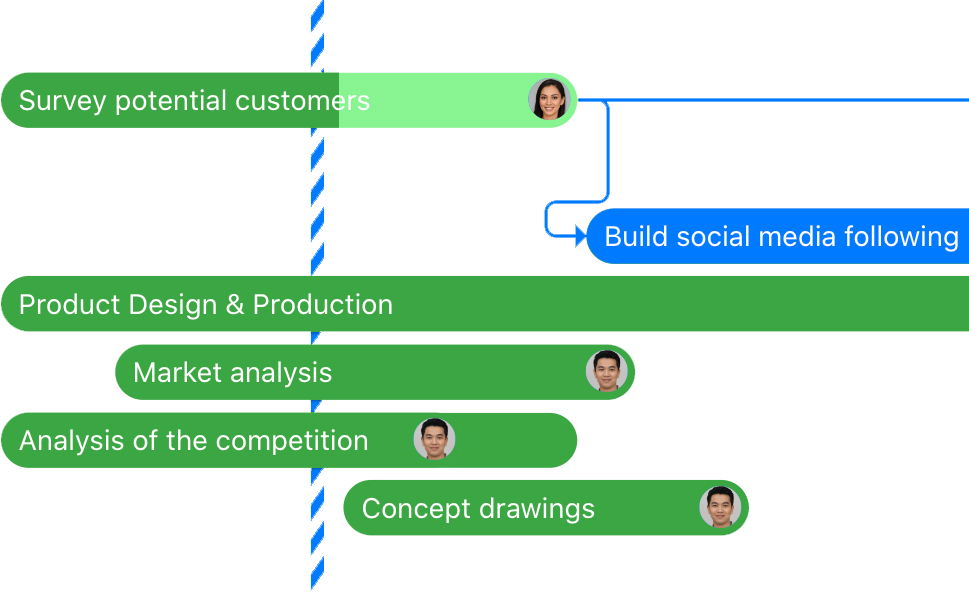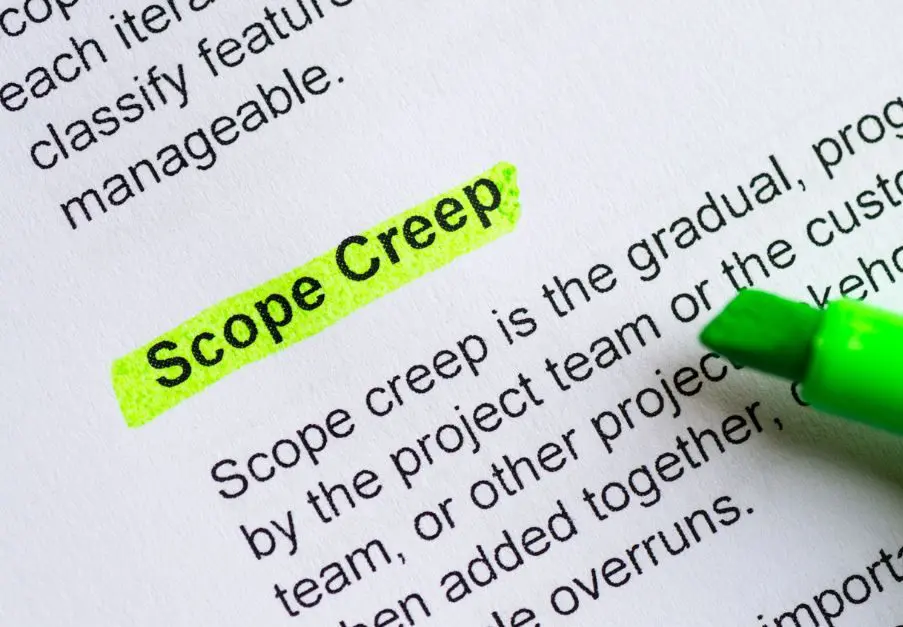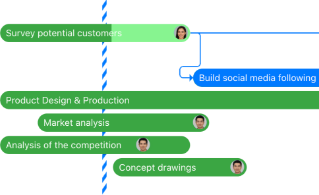
It is every project manager’s dream to have a team that not only smashes their goals but creates effective collaboration in the workplace while doing it. While not an impossible feat, it’s not a given either. Here’s what your team will need for successful team collaboration.
Why is Team Collaboration Necessary?
Team collaboration is nothing new, and there’s more to it than just making sure everyone gets along with each other. It’s about finding new ways of working as a team, fostering an innovative culture, coming up with new team collaboration ideas to achieve goals and objectives, and acquiring better solutions.
With the world more connected than ever, and a bustling freelancing/entrepreneurship/DIY work culture on the rise, knowing how to develop lasting working relationships has never been more important. It is also necessary for business growth and development, as well as for keeping ahead of your competitors.

When it comes to project management, the benefit of team collaboration is not only delivering the project with ease and success, but it’s also about achieving a sense of accomplishment with the group and gaining new experiences and insights.
What Does Successful Collaboration Look Like?
Successful team collaboration is going to look a little different depending on your team’s goals and objectives. Generally speaking, however, if said goals and objectives were met in an enthused and unified fashion, then that’s something to be pretty happy about.

Here’s what you’re team’s going to need for effective collaboration in the workplace.
Elements of Effective Team Collaboration & Best Practices
1. Great Communication
Effective communication is what separates successful teams from the ones who fail. Having clear instructions from the get-go and throughout the project delivery, asking questions instead of making assumptions, and actively listening to the members of your team can not only create a culture of camaraderie but also provides transparency in your responsibilities and expectations. It can also reduce stress levels and tensions that can sometimes arise when working closely with others.

2. Engaged Employees
An employee who is detached from the work, their peers, and the project’s goal is not going to want to collaborate. To prevent a disengaged team, ensure that every member knows their purpose and that their contribution to the project is valued. Remember that an engaged team is also a happy and focused one, too.
3. The Right Leaders
A successful team is not without its expert leaders. Being tasked with the responsibility of guiding a team towards their target is not an easy thing to do, and requires a fusion of technical, personal, and organizational skills. Your job as a project manager is to ensure a kind of harmony that not only drives the team to meet their objectives within the set timeframe and criteria, but also to accommodate the different individuals in the team, and foster a collaborative working environment.
4. Skill of Compromise
Having a group of people with different ambitions and egos will mean that everyone won’t always see eye to eye. But knowing how to compromise — a core element of team collaboration skills — is what will get everyone to agree on a solution, and keep the work flowing smoothly. Not only does it illustrate consideration for your fellow team members, but it also demonstrates your willingness to be cooperative, and set differences aside for the sake of the team and its success.
5. Conflict Management
Sometimes when you group together a bunch of people to work on a project, there can be unfortunate instances where they may not get along (which is a big no-no for effective team collaboration). Although as a project manager it is ultimately your job to resolve any conflict that may arise within the team, it is a great skill for team members to be able to manage and resolve any issues themselves. This type of skill displays remarkable team collaboration, and can also strengthen the bond between team members.
6. Reliability
Reliability builds trust, and without it, you don’t really have a team, you just have a bunch of people working together begrudgingly. Being part of a team means having to rely on others to hold up their end of the bargain. The success of a team depends on every member’s efforts and contribution. This is especially the case for teams that have members working remotely.
7. Team Player Attitude
An absolute must-have of team collaboration is, of course, team players. Having a ‘team player attitude’ means committing to your team, and putting the group’s best interest ahead of yours. What needs to be remembered is that, in this context, the effect of a combined effort is greater than individual performance. So if you want your team to reach their goal, everyone has to work together to achieve it.
8. Diversity
Diversity doesn’t just apply to the different skill sets and expertise of the roles required to deliver the project, but also to the personalities of the individuals in the roles. The beauty of working in a team is that it exposes people to different perspectives and experiences, which does wonders for developing relationships. Plus, it’d be a tad ho-hum if you put together a group of people who were exactly like each other — nothing new would be learnt!

9. Open Dialogue
Creating an open dialogue where feedback goes both ways enhances the skills of your team, and solidifies trust. No one knows the efforts that you go through better than the people who work closely with you every day. Team members exchanging advice and constructive criticisms of each other will only improve performance, and build stronger relationships.
10. A Team Collaboration Tool
The reasons for using team collaboration software are quite straightforward. As a vital element of effective collaboration in the workplace, they offer your team a centralized solution where all the project’s work can be announced, shared, updated, and executed. Using a tool like Zenkit comes with features that can further heighten team collaboration skills. For example, its integration feature with chat platform apps will make communication between team members easier and more accessible, and its visual scheduling system allows for project transparency so that everyone is aware of their responsibilities, and how the project is coming along.
How to Foster Team Collaboration Best Practices
Even if your team are already aware of team collaboration best practices, it’s not enough to just have them, you have to ensure that they are ongoing until the team is no more. Here are a few tips you can try to keep the harmony going.
Make sure everyone knows each other
The very first thing you should do, once the team has come together, is to do some ‘get-to-know-each-other’ activities. Once the project has started, and you feel your team needs a little refresher, you can always set aside time to do team-building activities to keep the momentum going. When people know who they’re working with, it creates a more relaxed, and friendlier working environment.
Maximize team member strengths
Knowing the strengths of individual team members not only makes you a great team leader but can optimize the team’s overall performance. Every member will bring something unique and valuable to the table. For instance, you may have someone who excels at breaking down instructions, or you might have the world’s most organized person on deck. Whatever their talent is, developing it and encouraging them to utilize it will not only boost the group’s efficiency but is also great for your team members’ personal development.
Set an example
The best way to encourage team collaboration skills is to showcase your own. As the project manager, your behaviour and attitude influence how your team conduct themselves. Be reliable, provide constructive feedback, communicate effectively, listen and compromise with your team, and ensure you are trained and well versed in using whatever team collaboration tool you choose so that you are on hand to offer any guidance or support that is required.
How do you encourage collaboration within your team? Share your tips with us in the comment section below!
Cheers,
Dinnie and the Zenkit Team





Leave a Reply